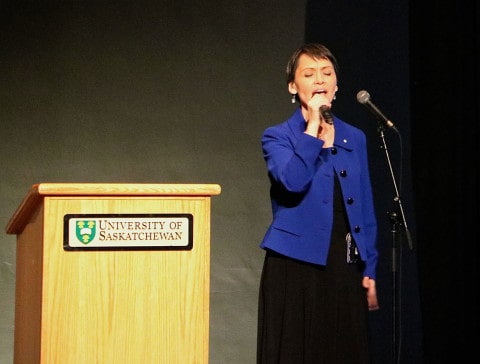Juno Award-winning and internationally renowned singer-songwriter Susan Aglukark has been developing and teaching a first-year music class as part of the Aboriginal Fellowship for Creativity at the University of Saskatchewan, which culminated in the presentation of Nomad, a powerful lecture held on Mar. 9 at Convocation Hall.
The fellowship is offered through the Interdisciplinary Center for Culture and Creativity at the U of S.

Susan Aglukark uses her voice to elevate important issues affecting Inuit and Indigenous communities in Canada.
Aglukark’s musical career came about by chance in the 1990s. Having moved to Ottawa to work as a federal government translator, she used songwriting to process some of the difficulties of her past. Aglukark quickly achieved commercial success, providing a platform from which to advocate for the rights of Inuit peoples.
She says that a denial of access to basic needs such as food and housing has contributed to a suicide epidemic in northern Indigenous communities.
“I’m doing what little I can do to keep the issue in the forefront of our political leaders, so that it doesn’t become the same problem in 10 years, in 20 years,” Aglukark said.
Aglukark’s class, Music 125: In the Company of Music, is geared in part towards first-year and second-year students of Indigenous ancestry who hope to pursue a career in music. She was struck by her students’ drive, noting that they were undeterred by the prospect of having to work second jobs. Aglukark points out that this is partly why she took on the fellowship: to support her habit of singing and writing songs.
Drawing on personal experience, she stresses the need for would-be musicians to remain business-savvy and autonomous in their careers while not losing sight of their reasons for choosing this profession.
“Stay in love with the thing that feeds your spirit and your soul. And that is your music, that is your writing, that is your art,” she said.
Though she has yet to discuss it with the university, Aglukark hopes to teach this class at the U of S again, citing a deep connection with her students.
“I come from the environment they come from. I understand the fears all too well that we are challenged with in the early parts of our learning journeys, our career journeys,” she said.
Aglukark lends her voice to suicide intervention through organizations like Collateral Damage, for which she serves as an advisor, and a project she initiated called the Arctic Rose Project, which seeks to reduce harm through creativity for youth whose trauma could put them at an increased suicide risk.
“I want to leave behind a tangible plan that young people can get into now if they want. So here’s an art project. Here’s a journaling project. And here’s an outlet for you right now. ‘Cause I can leave this with you right now. You can take it away in your hands right now.”
Her advocacy work and the ways in which she channeled her commercial success reflect a profound reverence for her culture, earning her many accolades, including two honorary law degrees and a doctorate in fine arts.
Dean McNeill, faculty professor from the department of music, approached Aglukark about the creativity fellowship that she just completed with a presentation in this year’s Fine Arts Research Lecture Series. FARLS provides a forum for artists in academia to present their research and the lectures are sponsored by the U of S, the College of Arts and Science and the departments involved.
“The lecture itself is titled Nomad, and it’s a combination of visual, film and singing. And what it does is it breaks down from my viewpoint the effect of rapid change, psychologically and culturally, on Inuit people,” she said.
Aglukark has worked on Nomad for the past 10 years. Spanning millennia, it features several stories that she says speak to social inequities plaguing Inuit communities today.
“‘E-186’ is a song that talks about the Eskimo identification dog tag system, which was used among the Inuit for quite a few years, and then the third of six or seven songs was a song called ‘Never Be The Same,’ which is a song I wrote after reading a story about Inuits with tuberculosis being shipped to hospitals and often never coming back home.”
Aglukark says that this rapid change has contributed to endemic suicide rates in Inuit communities, which she points out are a staggering 11 times higher than the Canadian national average.
—
Patty Hails
Photo: Kyra Mazer
Leave a Reply